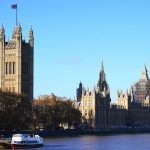Britons aged 18-29 will be offered an alternative to the Oxford-AstraZeneca vaccine following 79 people developing blood clots after the jab, government advisors have decided.
The Medicines and Healthcare Products Regulatory Agency (MHRA) concluded there is a possible link between the Oxford vaccine and “extremely rare and unlikely to occur” blood clots with lowered platelets.
Younger people are much less likely to die from COVID-19 so the Joint Committee on Vaccination and Immunisation (JCVI) has decided it is safer to advise them to consider getting another vaccine.
Follow live COVID updates from the UK and around the world
England’s deputy chief medical officer Profess Jonathan Van-Tam said the new advice is a “course correction” for the UK’s “very successful” vaccine rollout – and said for most age groups the “benefits outweigh the risks”.
The advice is being given after a total of 79 people in the UK have had blood clots following their first Oxford-AstraZeneca jab up to the 31 March, Dr June Raine, chief executive of the MHRA said.
Of those people, 19 have died – three under the age of 30, she said.
A total of 51 women and 28 men aged 18 to 79 were affected.
“The risk is four people in a million,” Dr Raine added.
She said anybody suffering the following side effects four days after getting a jab should seek medical attention:
The JCVI has said people of any age who have received the first dose of the Oxford vaccine should continue to be offered the second dose according to schedule.
JCVI chairman Professor Wei Shen Lim said: “We are advising a preference of one vaccine over another vaccine for a particular age group out of utmost caution rather than any serious safety concerns.”
He added that people who are just over 29-years-old should make their decision, but getting the vaccine is much safer than not getting it.
The reassurance that pharmacovigilance in both the United Kingdom & the EU works well. This is important in maintaining confidence in the largest vaccination program in history. As @BorisJohnson has said; We will follow the advice & are confident in meeting our programme targets.
Prof Van Tam said it is quite usual for physicians to alter their preference on medicines and vaccines, and said the NHS will get the “right vaccine to you at the right time” but said some people may have to travel further for their vaccines.
He said it remains “vitally important” that people get their vaccine when they are invited.
Currently, the UK is also rolling out the Pfizer jab, and the first doses of the Moderna vaccine were administered today in Wales.
The decision from the Joint Committee on Vaccination and Immunisation follows a review of the Oxford jab by the Medicines and Healthcare products Regulatory Agency.
At the weekend, it was revealed 30 people who have had the vaccine in the UK have developed a blood clot, out of a total 18.1 million people who have received it.
The MHRA confirmed seven of those people had died as of 24 March.
This afternoon, Boris Johnson said the government believes the Oxford/AstraZeneca vaccine is “safe”, telling reporters on a visit to Cornwall: “But the crucial thing for everybody is to listen to what the scientists, the medical experts have to say later on today.”
On the vaccination programme, he added: “You can really start to see some of the benefits of that – it’s pretty clear that the decline in the number of deaths, the decline in the number of hospitalisations is being fuelled, is being assisted, the steepness of that decline is being helped by the roll-out of the vaccines so it’s very important for everybody to continue to get your second jab when you’re asked to come forward for your turn.”
The development comes as the EU’s medicines regulator announced the conclusions of its own review, saying that “unusual blood clots” should be listed as a “very rare” side-effect.






















